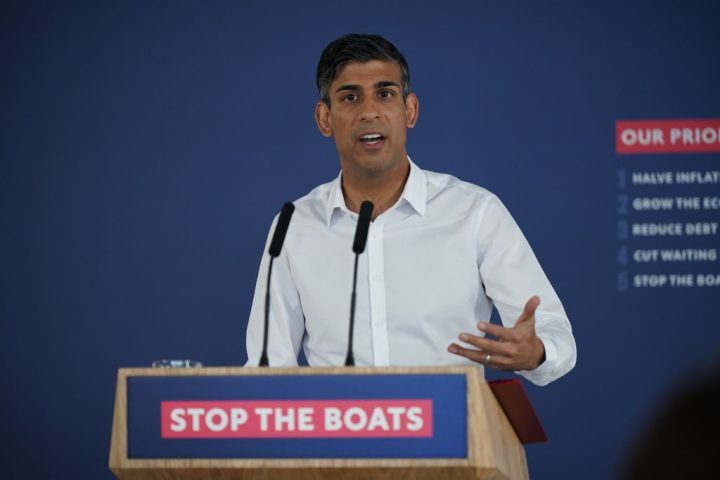Is Rishi Sunak stopping the boats? He’d certainly like us to think so. He spent much of yesterday in Dover parading the news revealed on The Spectator data hub last week that small boats crossing the Channel were down a fifth compared with the same time last year. By the end of May, the Ministry of Defence had detected 7,610 migrants crossing the channel in small boats. In the same months last year it was 9,607. A clear success then.
But is a 20 per cent reduction really job done? Or is Sunak standing on deck with the mission accomplished banner flying before the war is won? For starters the weather has a lot to do with it. Those at his Dover press conference were quick to point to choppy and windy weather. And looking at previous years, at the current rate of arrivals we’re still on course for the second highest year of illegal crossings on record.
Meanwhile, in the Mediterranean, crossings are up a third in the same period as Sunak was keen to point out. Credit then perhaps that we’ve cut crossings while the Italians are seeing them increase. But this could just be a warning of what's to come. The migration route to Britain is well established: through Spain or Italy to France, then on to Kent via 21 miles of the world’s busiest shipping lanes. It’s quite possible the surge of migrants in the Med just haven’t made their way up through France yet. Indeed France’s Office for Immigration and Integration reports an uptick in asylum claims this year.
Other data, released with last month’s net migration figures, shows where Channel crossers come from is changing. Almost all of the fall can be accounted for by Albanians: some 9,307 crossed between July and September last year. In the first three months of this year just 28 made the journey. Now nearly a quarter of small boat arrivals are Afghan, with just under a fifth from India. Unsurprising when you look at the respective grant rates: 96 per cent of Albanian applications are rejected or withdrawn while over 70 per cent of Afghans have their applications approved.
Immigration returns – either voluntarily or by deportation – have started to tick up too. Some 37,948 migrants were returned last year. Up nearly a third on the year before. The last three months of 2022 also saw the most immigration returns for four years.
But is the Albanian story all that it seems? Every three months for the past couple of years around 250 Albanians withdrew their asylum claims. In the first three months of this year nearly 4,400 did. A 1,600 per cent increase. Returns data isn’t available for the same quarter yet but are we really to believe some 4,400 left the country of their own accord?
The real issue remains the asylum backlog. It’s higher than ever. When dependents are included, some 173,000 people are waiting for their claims to be heard – up 6,500 since December. It’s these people trapped in limbo and barred from working that voters will notice. It’s these people crammed into hotel rooms that will remain in the news. Even if today was the last day a boat illegally crossed the Channel, the backlog would remain.
Perhaps in response to the backlog, and the tightening of routes into the country, asylum seekers are turning to other methods to be granted leave to remain. Another Home Office dataset reveals that more and more ‘age disputes’ – where a migrant's claim to be a child is doubted – are being raised by immigration officials. There were nearly a third more such disputes raised in the first three months of this year compared with 2022. Many are found to be adults. Last year just under 40 per cent of resolved cases were found to be adult migrants wrongly claiming to be children. Figures so far this year are similar.
Any hope Sunak’s government has of re-election (the Tories trail 16 points in the polls) are pinned squarely on meeting the five pledges. That doesn’t seem to be going well. Halving inflation – which was the easy one – is now in doubt, debt is forecast to grow for the foreseeable (though Sunak will claim a fall in terms of GDP), the NHS waiting list isn’t any smaller and the economy is narrowly avoiding recession. But it’s the fifth pledge: to stop the boats, that matters most. It’s the one thing that could prop up the red wall; after all when it comes to Brexit voters it was immigration that won it.
Sunak’s fifth pledge could not be more clearly worded. ‘STOP THE BOATS’, say signs behind the prime minister almost everywhere he goes. And to most people, stop means stop. It means no more GB News live landings at Dover, no more Farage renting a fishing boat. It surely means getting the numbers to near zero; it doesn’t mean having slightly fewer illegal crossings than last year. Put simply: 20 per cent won’t cut it.







Comments